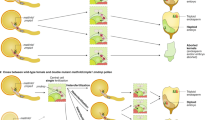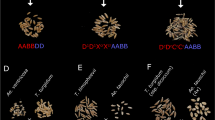Abstract
THE production of haploid plants from hybrids, followed by chromosome doubling, provides the plant breeder with a means of accelerating the development of desirable true breeding lines. This could be advantageous in breeding programmes particularly among some of the cereals where many generations, taking many years, may be required before an acceptable pure line variety can be obtained.
This is a preview of subscription content, access via your institution
Access options
Subscribe to this journal
Receive 51 print issues and online access
$199.00 per year
only $3.90 per issue
Buy this article
- Purchase on Springer Link
- Instant access to full article PDF
Prices may be subject to local taxes which are calculated during checkout
Similar content being viewed by others
References
Kasha, K. J., and Kao, K. N., Nature, 225, 874–876 (1970).
Islam, R., and Sparrow, D. H. B., Barley Newslett., 17, 40–42 (1974).
Subrahmanyam, N. C., and Kasha, K. J., Barley Gen. Newslett., 3, 62–65 (1973).
Kasha, K. J., in Haploids in Higher Plants, Advances and Potential, 67–87 (University of Guelph, 1974).
Author information
Authors and Affiliations
Rights and permissions
About this article
Cite this article
BARCLAY, I. High frequencies of haploid production in wheat (Triticum aestivum) by chromosome elimination. Nature 256, 410–411 (1975). https://doi.org/10.1038/256410a0
Received:
Accepted:
Issue Date:
DOI: https://doi.org/10.1038/256410a0
This article is cited by
-
Cytological, biochemical and molecular characterization of Triticum-Aegilops amphiploids
Journal of Plant Biochemistry and Biotechnology (2023)
-
Exploring MATRILINEAL (MTL) gene-based in vivo mutations to induce haploidy in wheat
Cereal Research Communications (2023)
-
Developing genetic stock for yellow and brown rust resistance in Triticum aestivum L. via Imperata cylindrica-mediated doubled haploidy technique
Cereal Research Communications (2022)
-
Comparative efficiency of triticale × wheat derived F1, F2, F3, BC1F1 and BC1F2 recombinants towards Imperata cylindrica-mediated doubled haploid induction
Cereal Research Communications (2022)
-
Haploid induction and its application in maize breeding
Molecular Breeding (2021)
Comments
By submitting a comment you agree to abide by our Terms and Community Guidelines. If you find something abusive or that does not comply with our terms or guidelines please flag it as inappropriate.



